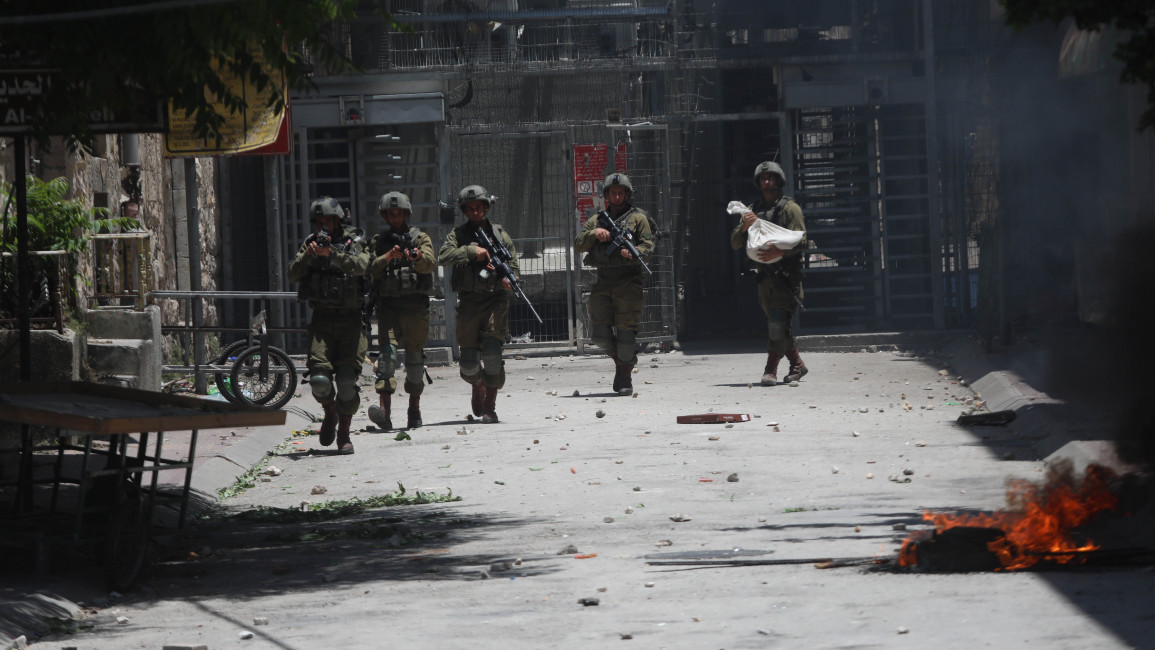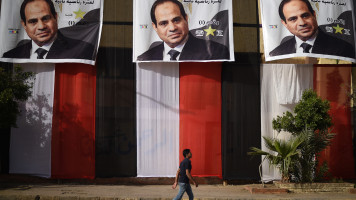
Amid Gaza's devastation, Israel wages another war in the West Bank

On 20 October, the Israeli military evicted prominent Palestinian activist, Issa Amro, from his home in the occupied West Bank city of Hebron after he hosted an Israeli activist and Australian journalist.
“They didn't like that I'm writing against the war on Gaza and doing videos [on social media] so they punished me,” Amro told The New Arab, mentioning that soldiers turned his yard into an army outpost.
Prior to the eviction, Amro said he was detained and beaten by Israeli forces for ten hours on 7 October, the day of the Hamas incursion.
The Israeli military did not respond to requests for comment on Amro’s detention or his eviction by the time of publication.
Since Hamas’ attack and Israel’s subsequent war on the besieged Gaza Strip in response, Palestinians in the West Bank have experienced an intensified Israeli crackdown.
"It's a war all over, from the West Bank to Gaza to East Jerusalem. The war is on all Palestinians but in different forms"
Israel escalating attacks in the West Bank
Israel saw its most brutal assault from Palestinian militants in the state’s history when Hamas launched their deadly attack earlier this month - with 1,400 Israelis killed. Israel’s retaliation has been severe, enacting a bombing campaign against the Gaza Strip unlike anything the region has experienced.
More than 9,000 Palestinians have been killed so far, including 3,600 children, with the death toll likely to increase as Israeli soldiers on the ground invade the coastal enclave.
As Israel’s war on Gaza persists, Palestinians in the West Bank say Israel has launched a war against them too.
“It's a war all over, from the West Bank to Gaza to East Jerusalem,” Amro said. “The war is on all Palestinians but in different forms.”
Since the war began, Israeli forces and settlers have killed 129 Palestinians, including at least 35 children, in the West Bank in less than a month, according to documentation from the Palestinian human rights organisation, Al-Haq, which was shared with The New Arab.
The majority of the fatalities occurred during Israeli army raids on Palestinian villages, towns, and refugee camps.
“Whenever there's a raid, you would see confrontations by the locals and then Israel will employ its shoot-to-kill policy against Palestinians,” Aseel Al Bajeh, a legal researcher and advocacy officer at Al-Haq, told The New Arab.
Al Bajeh described how 11 October was one of the bloodiest days in the West Bank since the war began. Then, Israeli settlers stormed Qusra village, south of Nablus, resulting in settlers and soldiers killing four Palestinians.
“Israeli occupying forces joined in and did not only stand passively, but they actually supported the settlers and killed a fourth Palestinian in the same day,” Al Bajeh said.
|
|
The next day, settlers attacked the funeral procession - killing a Palestinian man and his son. Elsewhere, on 12 October, a group of Israeli soldiers and settlers brutally assaulted three Palestinians in the village of Wadi al-Siq, near Ramallah.
According to their testimonies, they were beaten, stripped to their underwear, bound, and photographed. Two of them were allegedly urinated on, one had cigarettes put out on his body, and another was sexually assaulted when an assailant tried to insert an object into him.
According to the victims’ accounts, the line between settler and soldier was blurred throughout the attack, with the Palestinians sometimes unable to tell which was which.
Victim testimony given to Al-Haq detailed how the Israeli Civil Administration (ICA), Israel’s governing body of the West Bank, arrived during the assault to check the Palestinians’ IDs and told the armed group that the three Palestinians were previously arrested and committed security offensives. The ICA then allegedly left and the attackers carried on.
"As Israeli missiles rain down on the Gaza Strip, the West Bank is also facing aerial bombardment"
“The person who gave the testimony said it was like they gave a green light for settlers to continue attacking and beating us,” Al Bajeh said.
The Israeli army said military police have opened an investigation into the incident and that the commanding officer was removed from his post.
Israeli forces have also been accused of using live ammunition more liberally, whether that’s during solidarity demonstrations, army raids, or confrontations between soldiers and Palestinians.
“Through our documentation and investigation, it becomes clearer for us that the rules for open fire have relaxed more and more,” Ayed Abu Eqtaish, accountability programme director at rights organisation, Defence for Children International – Palestine (DCIP), told The New Arab.
Intensified raids have led to a surge in detentions of Palestinians. More than 1,700 Palestinians have been arrested in the West Bank since 7 October, according to reporting from Al-Haq.
“Israeli occupying authorities are now intensifying their collective punishment measures,” Al Bajeh said. “Whether you protest, post on social media, whether you’re an activist, you’re subjected to collective punishment either by killing you as a protester or arresting you.”
According to Palestinian prisoner rights group, Addameer, Palestinian prisoners are experiencing harsher conditions, such as electricity being cut off, water restricted to one hour per day, clinics shuttered, and canteens closed.
Restrictions outside of jail have also intensified, pushing many Palestinians to become prisoners in their own homes.
|
|
Amro described how the Israeli army has enforced a lockdown on Palestinian areas of Hebron, with residents only allowed to leave their homes for food every two days between 18:00-19:00. Again, the Israeli military did not respond to inquiries regarding the lockdown.
The southern West Bank city isn’t the only place where Palestinians are closed off from each other. Younes Arar, a Palestinian rights activist, described how the Israeli army has barricaded village entrances either with an increased military presence or cement blocks.
“Palestinians can't use main roads at all since the beginning of this aggression against Palestinians in Gaza, so people look for alternative roads that are internal, in between towns and villages,” Arar said, explaining how it took him three hours - double the usual amount of time - to get from his home in Beit Ummar, north of Hebron, to Ramallah for work.
And as Israeli missiles rain down on the Gaza Strip, the West Bank is also facing aerial bombardment. Over the last few weeks, Israeli airstrikes have turned parts of the refugee camps in Tulkarm and Jenin into rubble.
"More than 1,700 Palestinians have been arrested in the West Bank since 7 October"
In the latest attack, Israeli forces killed 16-year-old, Mousa Khaled Mousa Jabarin, using a drone-fired missile on 30 October in the Jenin refugee camp, according to documentation from DCIP.
Al Bajeh described how the levelling of Palestinian infrastructure is a key tactic Israel is using during its raids in the West Bank.
Over the last few days, Israeli forces bulldozed the iconic arched gateway to the Jenin refugee camp as well as razing the Horse Roundabout statue made from the remains of an ambulance the Israeli army bombed in 2002.
Israeli forces also bulldozed a monument and road in Jenin dedicated to Shireen Abu Akleh, a Palestinian journalist killed by the Israeli army in 2021.
“Israel is playing on a kind of psychological warfare against Palestinians that anyone is subjected to violence and intimidation in order not to have anyone confront this apartheid regime,” Al Bajeh said.
Yet like a phoenix rising from the ashes, Al Bajeh described how Palestinians continue to press on despite the destruction, describing how following the raid on Jenin Palestinians took to the streets and chanted.
“We will continue to resist, the damage that has been caused will be repaired, and the lives that have been lost are irreplaceable, but we will keep fighting against this occupation.”
Jessica Buxbaum is a Jerusalem-based journalist covering Palestine and Israel. Her work has been featured in Middle East Eye, The National, and Gulf News.
Follow her on Twitter: @jess_buxbaum




